Looking for new road cycling shoes? We’ve pedalled thousands of kilometres to help you pick the best pair for you
Your feet are one of the most important contact points on a bike, so it’s vital to choose your cycling shoes carefully. There’s a lot of choice though, so it can be hard to know what’s best. Fortunately, you have come to the right place.
We’ve put in the miles, so you can find the best cycling shoes for your performance requirements, riding style and budget.
If you need something to clip into, check out our guide to the best road bike pedals. If road cycling isn’t your only riding discipline, or you prefer SPD vs SPD-SL pedals, check out our buyer’s guides to the best mountain bike shoes, best gravel bike shoes and best mountain bike pedals.
Once you’ve considered all of the options, keep reading to the end for our buyer’s guide to road cycling shoes.
Best cycling shoes in 2024, as rated and reviewed by our expert testers
With so many cycling shoes on the market and so much choice, we’ve split our pick of the best cycling shoes into different price categories, from performance-oriented shoes that cost around £400 to budget-friendly shoes under £100.
Keep scrolling to see all the shoes or click on the links below to skip to the different price points:
- Best cycling shoes for £100
- Best cycling shoes for £150
- Best cycling shoes for £200
- Best cycling shoes for £300
- Best cycling shoes for £400
Best cycling shoes for £100
Bont Motion
- £80 as tested
- Pros: Very stiff soles; adjustable cleat bolt holes; replaceable heel bumpers
- Cons: Heavier than the competition; potentially too rigid for some
The Motion shoe brings Bont’s signature stiffness to a lower price point, thanks to the fibreglass sole.
The shoe is heavier than similarly priced competitors. This is likely attributed to the fibreglass sole but some will find this weight penalty worth bearing for the shoe’s stiffness.
The Motion is built around Bont’s anatomic last. While this leads to a less sleek-looking shoe than some other brands, it does create a slightly wider – and more comfortable – fit.
Dials might be preferable to the Motion’s Velcro straps, but this does keep the cost down, and there’s no getting away from the fact this shoe offers a lot of value for money.
Quoc Escape Road Lace

- £130 / $180 / €160 as tested
- Pros: Nice aesthetics; competitive price; comfortable
- Cons: Lacking arch support
The Escape Road Lace shoes are Quoc’s entry-level road cycling option and they punch well above their relatively affordable price.
Combining an ageless lace-up design with a carbon composite sole, the Escape Road Lace is comfortable and will be sufficiently stiff for most cyclists.
What’s more, welcome details such as adjustable cleat bolt holes and replaceable heel bumpers are unusual in this price category. It would be good to have more arch support though.
Van Rysel RoadR 900 Full Carbon
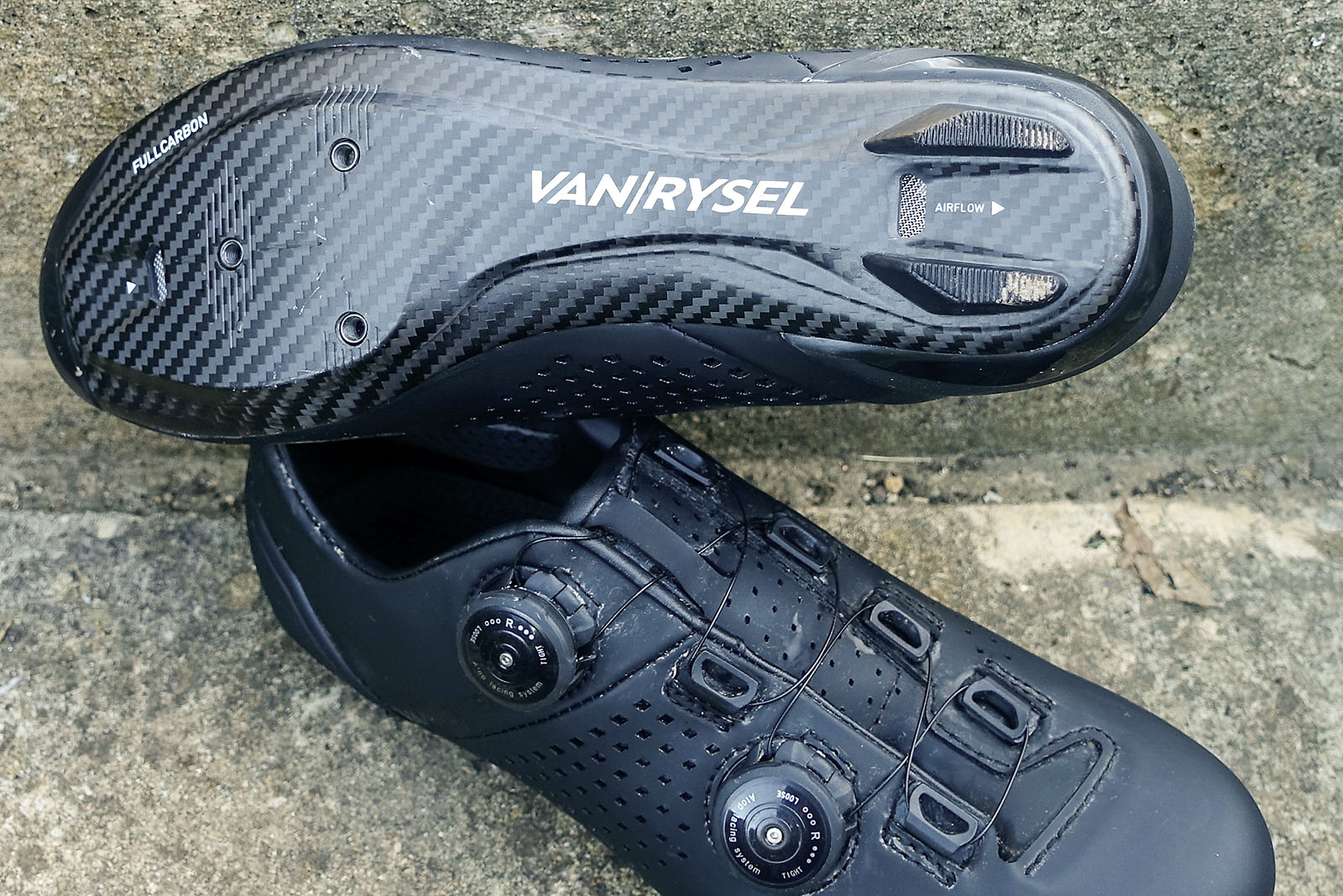
- £120 / $199 / €135 / AU$199 as tested
- Pros: Brilliant value; full carbon; twin dials
- Cons: Fairly small toe protector
The Van Rysel RoadR 900 Full Carbon has a carbon sole, which, along with a supportive insole and two dials to adjust tension, comprises a stellar spec for the money.
The Van Rysel RoadR 900 Full Carbon is as good to ride in as these features suggest. You’ll be hard pressed to find a better road cycling shoe at this price.
The only downside is that some riders may want more reinforcement in the toe area.
Bontrager Solstice

- £100 / $85 / €105 / AU$105 as tested
- Pros: Compatible with SPD-SL and SPD cleats; light for the price
- Cons: Minimal ventilation
The Bontrager Solstice is an uncomplicated road cycling shoe that punches above its reasonable price.
Since it has Velcro closure straps, a moderately stiff nylon sole and is compatible with SPD-SL and SPD cleats, the Solstice could suit riders who are new to clipless pedals. Unfortunately, the two-bolt cleat adaptor is not included.
The weight per shoe of 227g in EU42 is competitive, but ventilation might be inadequate for riding in hot weather.
Triban GRVL 500

- £50 as tested
- Pros: Great value; lace-up; SPD-compatible
- Cons: Heel raise could limit performance
The lace-up Triban GRVL 500 shoe comes in at a super-low price, but it still has a host of features.
The shoe has a nylon sole with fibreglass reinforcement. The sole is compatible with SPD cleats and has deep rubber sections for grip and walking.
The GRVL 500 provides excellent comfort on day-long rides, and while the sole is reasonably stiff, it doesn’t feel punishing.
You might find the shoe leads to your heel rising slightly when walking or riding hard, but overall there are no obvious drawbacks to this shoe.
It’s a good budget option for all sorts of riding, from commuting to more challenging off-road rides.
Best cycling shoes for £150
Udog Tensione

- £130 / $170 / €175 / AU$225 as tested
- Pros: Understated appearance; comfortable fit
- Cons: Not available in shops
The Udog Tensione shoes use a carbon composite / nylon blend outsole with twin inverted V-shaped ribbons either side of the mid-foot and laces to offer a comfortable yet close fit.
They were warm enough for spring rides in all weathers and not overly hot on summer days. The sole is superb on the road, offering efficiency and all-day comfort.
Being only available online, you can't try the shoes before you buy though.
Best cycling shoes for £200
Fizik Vento Omna

- £170 / $170 / €165 / AU$273 as tested
- Pros: Admirable performance without carbon; adjustable cleat bolts; comfortable
- Cons: Sparse ventilation; not full carbon
If a carbon outsole isn't essential for you, the Fizik Vento Omna could be a great shoe for most types of road cycling.
The nylon-composite sole is stiff enough for hard efforts. The padded heel, spacious toe box and supple upper provide plenty of comfort for longer rides.
In hot conditions, you might want more ventilation, but you usually have to spend more for a warm-weather road cycling shoe.
Van Rysel RCR

- £169.99 / $162.94 / €169.99 as tested
- Pros: Stiff; solid spec; adjustable cleat bolt holes
- Cons: Quite narrow
The Van Rysel RCR shoes cost half as much as some racy road cycling shoes. But perform nearly as well thanks to their rigid carbon sole, comfy uppers and premium rotary dials.
They look the part too and are well ventilated, especially on the sole, where two vents aid airflow to your feet.
The only downside our tester identified is that the RCR's low-volume toe box and narrowness across the forefoot may not suit wider-hoofed cyclists.
Shimano RC7
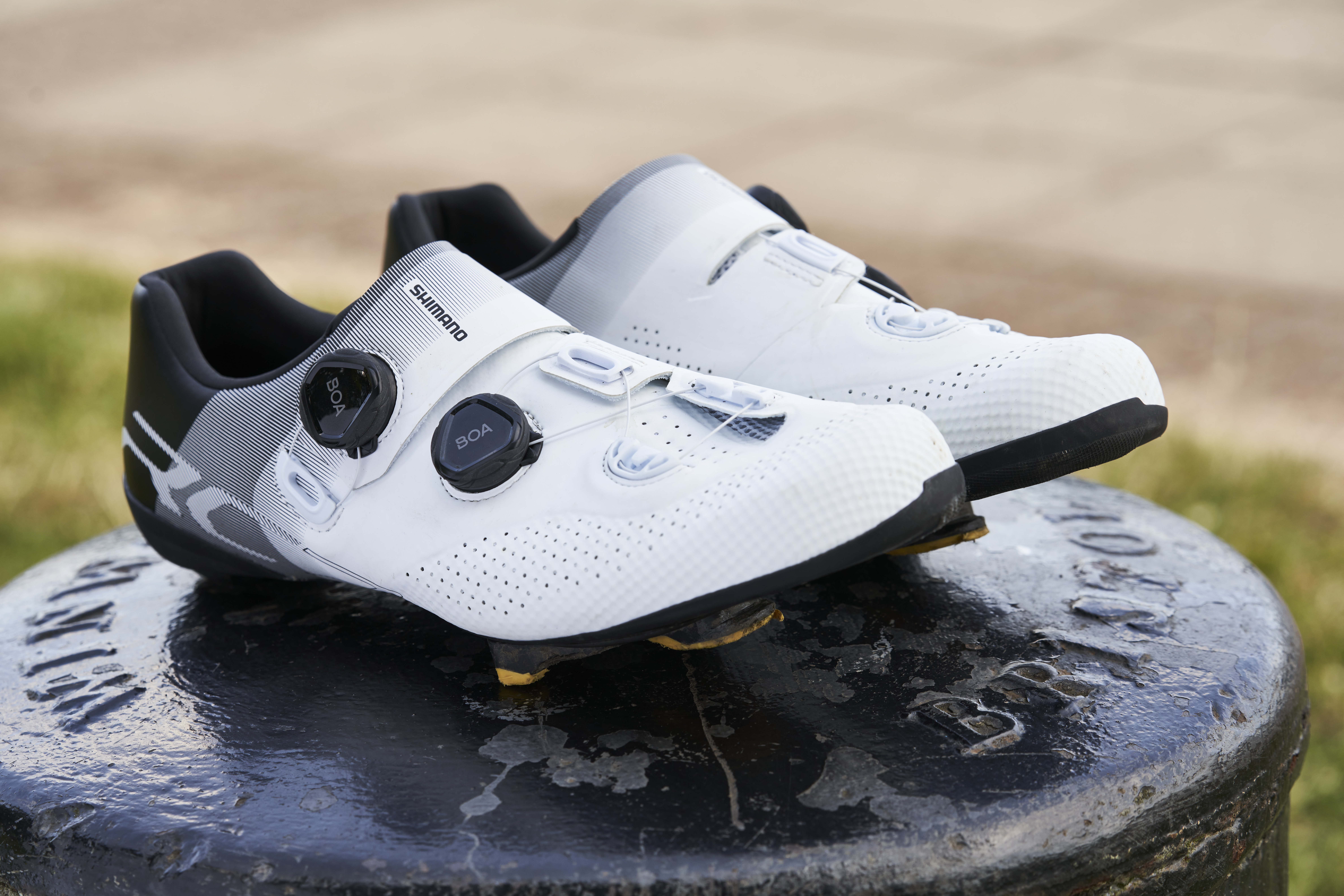
- £189.99 / €199.99 / $240 as tested
- Pros: Very versatile; good value; Boa dials
- Cons: Come up small; not the coolest
The Shimano RC7 goes toe to toe with the brand's priciest shoe, the S-Phyre RC902, delivering fantastic performance for much less money.
Compared to the RC902, the RC7 is a touch heavier and the sole is carbon fibre composite not full-carbon. The slight flex it gives is probably the best bet for the majority of your riding.
The shoe's upper feels nice, with a similar wraparound strap to the RC902, and dual Boa dials ensure an adjustable, secure fit.
Ventilation could be better, so the RC7 isn't ideal for warm-weather riding.
Scott Road Vertec Vent Boa

- £230 / $230 / €230 as tested
- Pros: Stiff soles; very cool; comfortable; adjustable fit
- Cons: One-way Boa dials
The well-ventilated Scott Road Vertec Boa shoes are an excellent choice for riding in the heat and their stiff soles feel efficient.
Scott specs the Road Vertec Boa with adjustable cleat bolt holes and supplies a set of footbeds, featuring removable arch support and metatarsal inserts.
But they're not the lightest and their unidirectional Boa L6 dials seem out of place. Two-way dials, which let you increase and decrease lace tension, are more common at this price.
Best cycling shoes for £300
Specialized S-Works 7 Lace
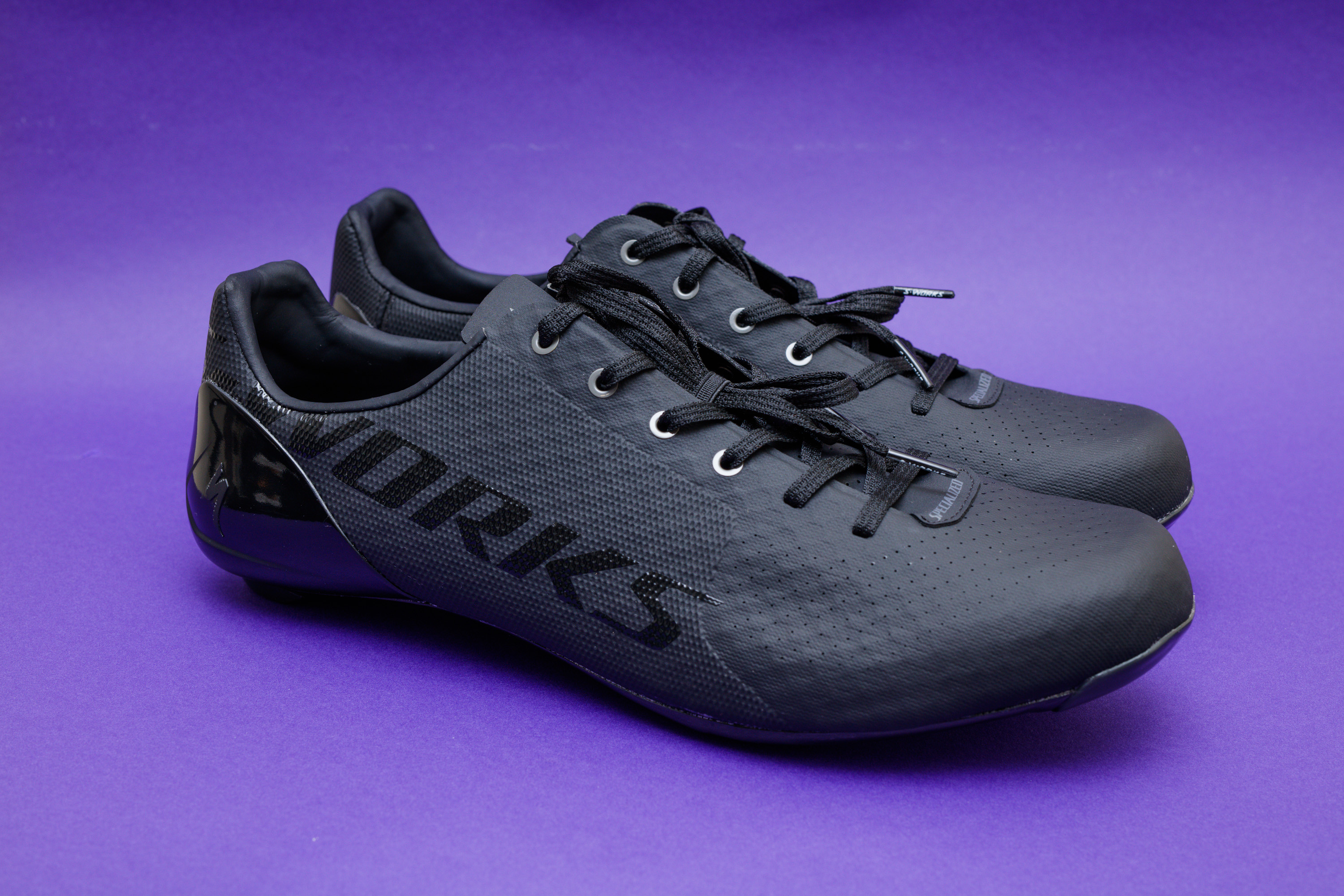
- £300 / $325 / €325 as tested
- Pros: Classic looks; cutting-edge performance
- Cons: No Warp Sleeve
The Specialized S-Works 7 Lace is one of the best lace-up shoes you can buy, in our opinion.
Lighter than many high-end shoes, the S-Works 7 Lace is also exceptionally stiff. But it remains sufficiently comfortable and ventilated to ride all day.
Although the laces preclude on-the-go adjustment, they contribute to an aerodynamic and stylish design.
Giant Surge Pro

- £299.99 / $399 / €360 as tested
- Pros: Brilliant performance; versatile; extremely stiff
- Cons: Expensive; only one width available
The Giant Surge Pro is the shoe worn at the WorldTour by Giant-sponsored Team Jayco-AlUla.
As you'd expect from a dedicated race shoe, the sole doesn't flinch under the force of big efforts.
There are no pinch points in the well-ventilated polyurethane upper. Two unidirectional Boa dials and a Velcro strap allow you to tweak tension.
Our testing found the Surge Pro's premier price to be largely justified. Handy extras such as adjustable arch supports and insoles are thrown in.
Fizik Tempo Decos Carbon
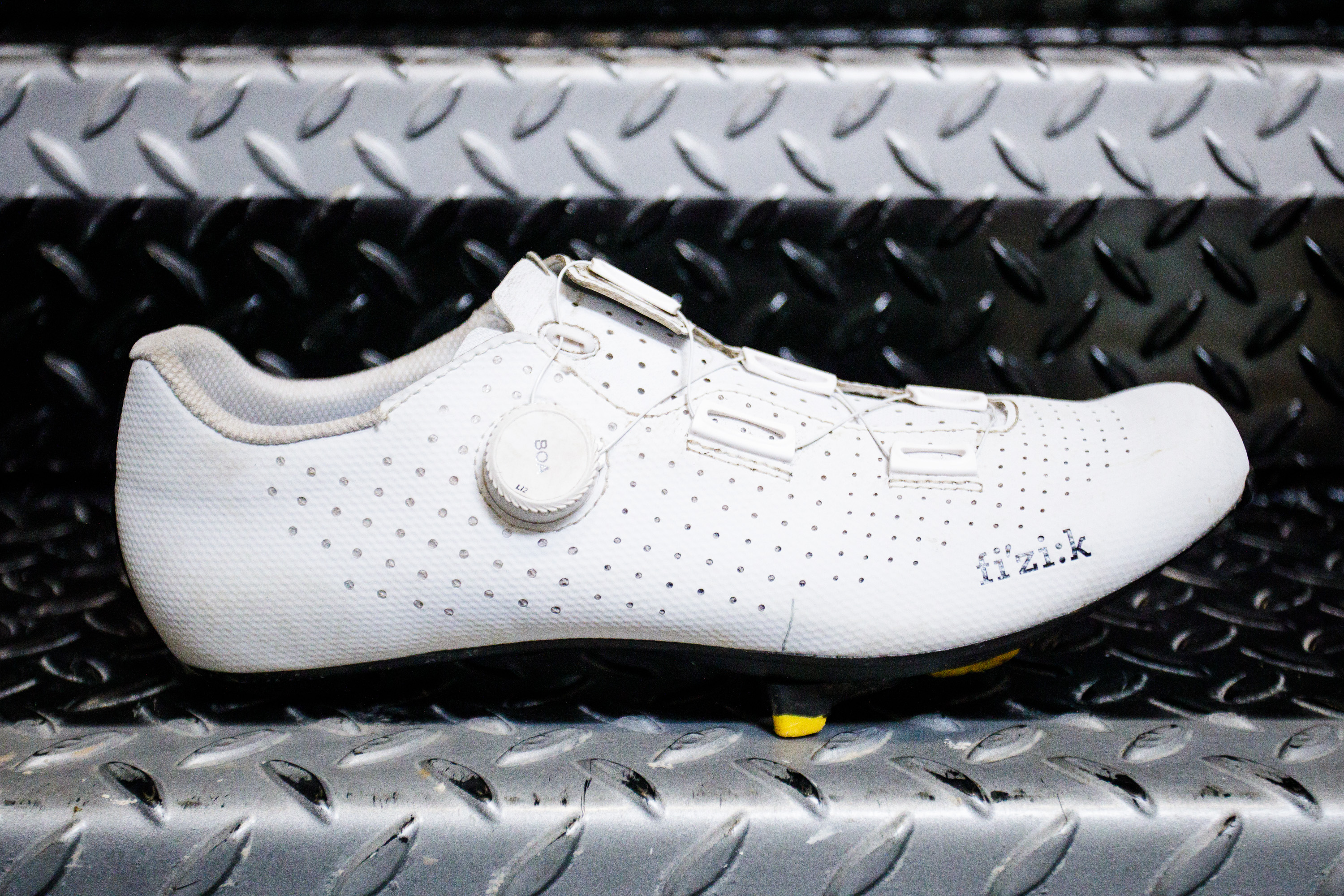
- £279 / $299.99 / €290 as tested
- Pros: Flawless comfort; stiff soles; airy
- Cons: Quite narrow; high RRP
The Fizik Tempo Decos Carbon blends comfort, performance and ventilation in an admittedly premium package.
The sole is formidably stiff, which gives the impression of efficiency without causing your feet to ache.
The light, perforated upper and vents in the sole permit airflow.
The minimalist Tempo Decos Carbon's single Boa dial turns both ways and distributes tension through the shoe.
Best cycling shoes for £400
Specialized S-Works Torch Lace

- £300 / $350 / €340 / AU$550
- Pros: Light; comfortable; stiff
- Cons: Premium price
The Specialized S-Works Torch Lace shoes excel across all types of road riding: they're comfortable and airy enough for long, hot rides and sufficiently stiff for full-gas efforts.
When you're going uphill, the S-Works Torch Lace's dainty weight (465g in EU45) can't hurt either.
The well-designed laces contribute to this weight saving and stay fastened while lying flat to the instep. Fans of lace-up styling will appreciate the sleek looks too.
Shimano S-Phyre RC902

- £320 / $425 / €360 / AU$549 as tested
- Pros: Stiff; efficient
- Cons: Narrow
Shimano’s top-flight S-Phyre RC902 road shoe builds on the success of the previous RC901 model and delivers across the board, with a stiff and efficient carbon sole and a good level of ventilation.
Adjustable cleat bolt holes allow you to set up your cleat just as you like. There are high-quality insoles with interchangeable arch supports included.
Shimano has updated the fit of the shoe from the previous model. While the wraparound upper and Boa dials make for a highly tuneable fit and heel retention is great too, we did find the forefoot of the shoe to be a bit narrow.
The wide version could be worth trying if you have broader feet or prefer a roomier fit.
Sidi Shot 2S

- £425 / €419 as tested
- Pros: Fantastic ventilation and stiffness; replaceable parts
- Cons: Weighty; not immediately comfy
The Sidi Shot 2S are very impressive and very expensive road cycling shoes. The carbon sole blends stiffness and comfort, while the ventilation is superb.
After bedding them in, the Shot 2S proved comfortable on extremely long rides. A dial on the heel enables you to fine-tune the fit.
Several parts of the Sidi Shot 2S are replaceable, so the shoes should provide many miles for your money.
DMT KRSL

- £330 as tested
- Pros: Ultra-light; breathable; stunningly comfortable
- Cons: Ill-suited to cold, wet rides
The DMT KRSL's 3D knitted shoe upper is matched with a carbon sole. There are four large, meshed vents for added breathability and these help to bring the weight down.
The shoes are ultra-comfortable and the stiffness and comfort is perfectly balanced. The fit is so snug that the laces seem as if they are a secondary security measure.
The heel bumper is replaceable and even on the hottest days, there wasn't a hint of sweat on our tester's feet. The downside is, the shoes can be somewhat chilly on cooler days.
Northwave Veloce Extreme

- £359.99 / $429 / €399.99 as tested
- Pros: Stiff; comfortable
- Cons: Very expensive
On the whole, the performance of the Northwave Veloce Extreme matches the shoes' high price tag. To sweeten the pill, they come with two sets of inner soles.
Since Northwave has prioritised comfort and efficiency over low weight, the Veloce Extreme shoes are fairly heavy (673g in EU45).
The Veloce Extreme use Northwave's own adjustment dials. These aren't as good as other systems, such as Boa dials.
But the Veloce Extreme shoes remain a good premium option if stiffness and comfort trump low weight for you.
Buyer’s guide to cycling shoes: what to look for
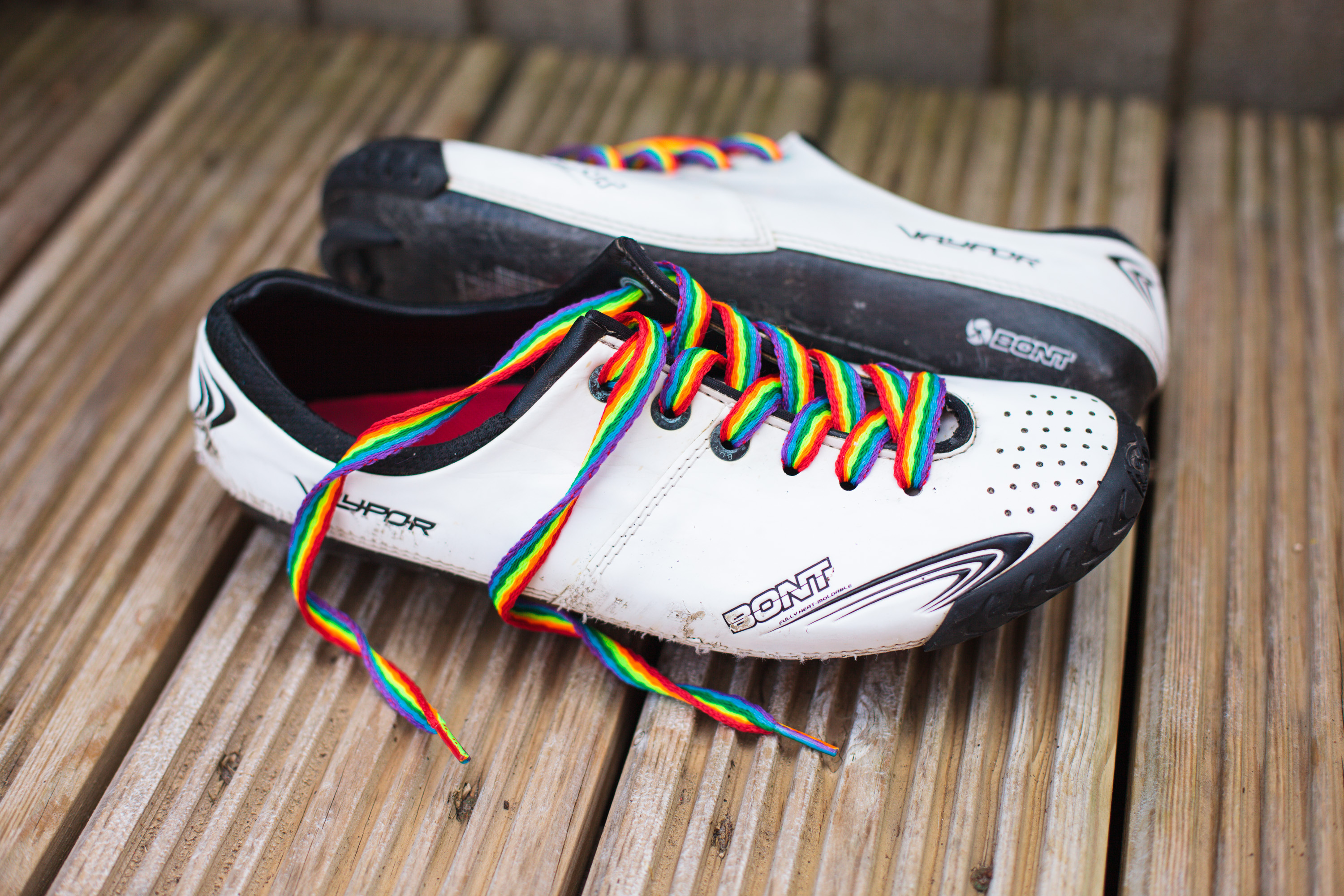
Shopping for cycling shoes can be a bit of a nightmare with so many options, and your local shop probably doesn’t stock everything you might want to try on.
Once you’ve been cycling for a while, you might have an idea of what works for you, but if you’re just starting out it can be daunting. With that in mind, we’ve compiled a short buyer’s guide to help you get to grips with the basics.
Fit
Cycling shoes, like any other shoes, are built around what’s called a ‘last’. This is essentially a mould, shaped like a foot, that brands use to shape their shoes.
Every brand has a different last, based on their own fit philosophy. Finding a shape that works for you is obviously very important, but the only way to find out is to try shoes on. We've got a guide to wide cycling shoes too.
So make sure you either go in to a shop in person or buy from an online retailer with a good returns policy.
Sole

As with most things bike-related, carbon is the material du jour when looking at cycling shoe soles. It does make sense though; prized for its ability to be stiff yet lightweight, carbon really is an ideal material for making cycling shoe soles.
The downside is, of course, cost. Entry-level shoes tend to use nylon or glass fibre composite soles in a bid to save money. These are likely to be slightly more flexible than full-carbon soles, but will still be streets ahead of standard training shoes, so it’s certainly not a huge loss if your budget doesn’t stretch to carbon.
Closure system

There are three main closure systems in use today. The most popular are Velcro straps or wire laces with micro-adjustable dials (Boa and similar).
Occasionally, you even get a combination of both. Velcro straps have the advantage of being cheap, effective and easy to use, so you’ll often find these on lower-end shoes. On higher-end shoes, Boa and other similar dial systems tend to dominate due to their ability to precisely control fit.
Traditional laces have also had a bit of a renaissance in the last few years, so if you like a classic look you’ll have a few more options now. Just remember you won’t be able to adjust your shoes on the bike.
Other features
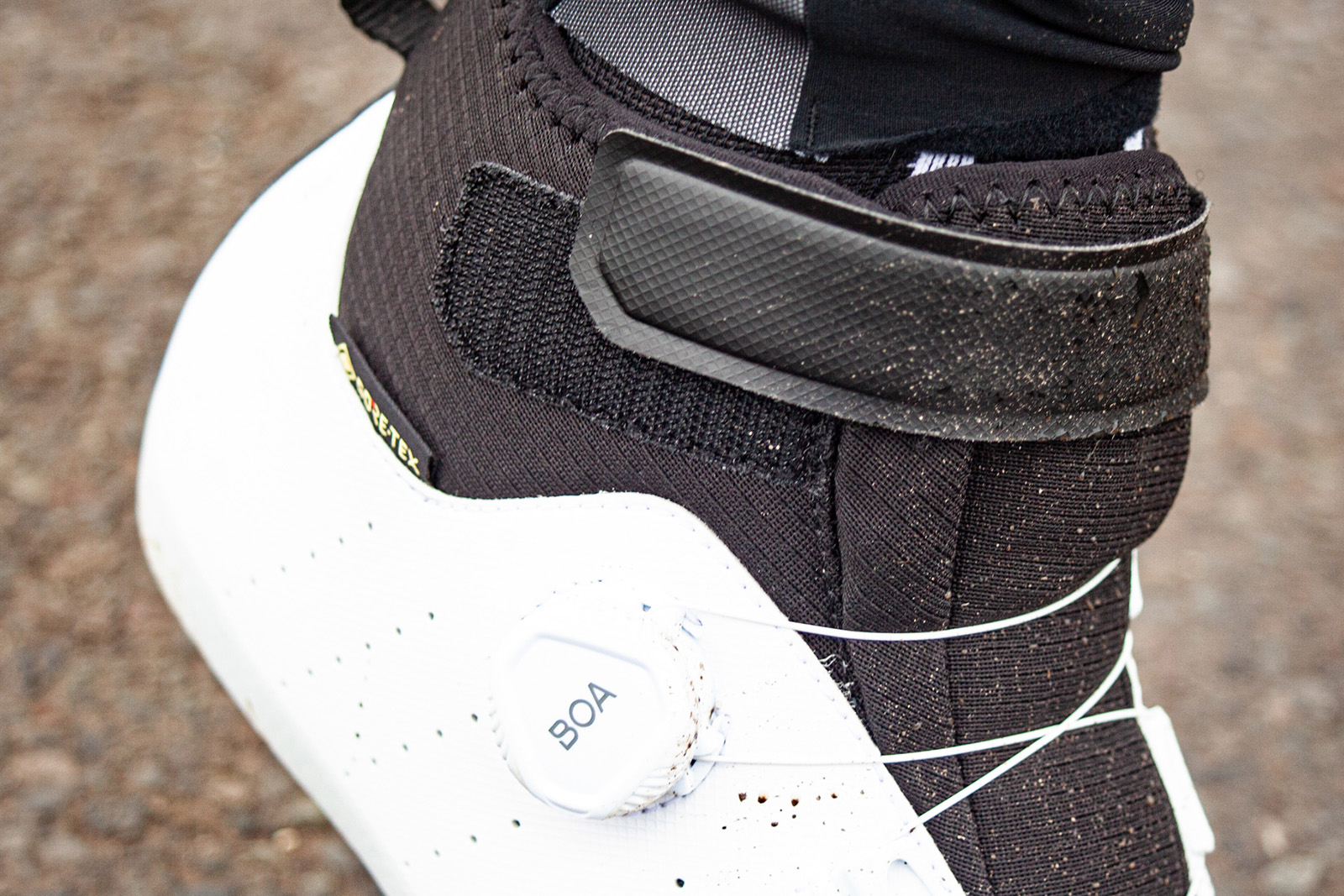
It’s always worth considering what type of riding your shoes are designed for. A lot of road cycling shoes are designed to be ridden in hot weather, for example, meaning they’re very breathable and won’t offer much protection from the elements.
If you live somewhere where the weather is invariably cold and wet, it’s worth considering whether those sorts of shoes are really the right choice, or if you’d be better off with something more robust.
Do cycling shoes make a difference?
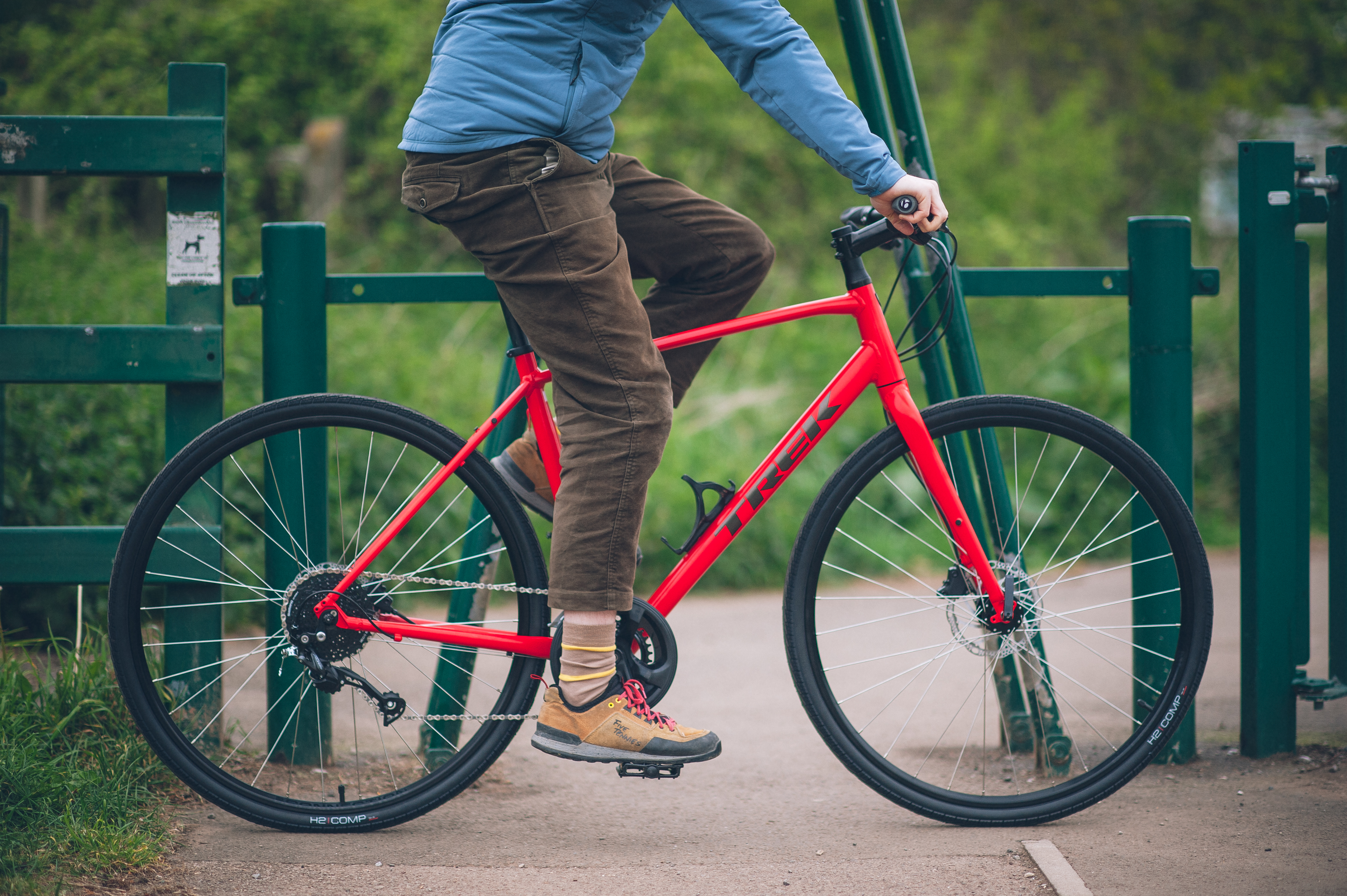
Cycling shoes and clipless pedals are the biggest upgrade you can make when you're new to road cycling.
They are designed to have little flex so the force can be transferred into the pedals.
As a result, you'll find your average speed will increase because your foot is locked into place, saving you effort and any needless fatigue.

They are also typically lighter than running or recreational shoes and offer improved ventilation.
However, road cycling shoes can quickly escalate in price.
If you're starting out cycling on a budget, you don't need to spend the earth and an entry-level shoe will have most of the key features you need to get you out on the road.
In fact, in a test we carried out, we're not sure cycling shoe stiffness actually matters.